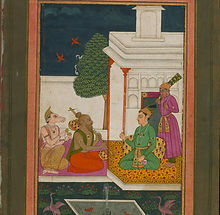Thumri
A concise composition of profound aesthetic significance, the Ṭhumrī constitutes one of the four primary forms of Indian classical music, alongside Dhrupada, Ṭappā, and Khayal. While it is considered an evolution from Khayal, and Khayal itself is seen as an evolution from Dhrupada, such theories should be approached with caution.
In comparison to Khayal, Ṭhumrī is shorter in duration and exhibits a substantial presence of ornamentation in the interplay of notes. Another distinctive feature of this form is its mode of exposition, often influenced by the subject matter of the lyrics and the mood of the vocalist or musician.
Throughout the years, three principal schools or Gharanas of Ṭhumrī have emerged:
1. The Lucknow Gharana, established by Wāzid Alī Shāh
2. The Benares Gharana, with uncertain origins but popularized by singer Muizuddin Khān around the turn of the nineteenth and twentieth centuries
3. The Punjabi Gharana, which integrates the Lucknow style with the traditional folk music of Punjab.
Among these, the Benares school is known for its solemnity and sobriety, rarely blending multiple Rāga and using notes without excessive ornamentation, allowing their purity to shine through and deeply resonate with the listener, evoking a sense of serenity.
Conversely, the Lucknow school explores lighter themes, rich in ornamental expressiveness, where each note appears as a cluster of embellishments. This style incorporates a significant use of Alaṁkāra, and the tempo is faster compared to the Benares style.
The Punjab style, in addition to its regional characteristics, stands out for its unexpected combinations of notes.
A distinct genre within Ṭhumrī is the Lācāva Ṭhumrī, often portraying the heroine's sacrificial attitude, with 'Lācāva' signifying 'the act of bending.' Love-themed songs frequently fall into this genre.
Ṭhumrī also serves as the name for a specific Rāga and Tāla.
INDIAN CLASSICAL MUSIC LESSONS AND ONLINE COURSES
IN MODAL MUSIC, IMPROVISATION AND COMPOSITION
LEARN THE MAIN TECHNIQUES OF INDIAN MUSIC WITH A SIMPLE AND PERSONALIZED METHOD!
My online music lessons are the perfect way to learn to sing, or improve the vocal techniques already acquired, or to start playing your favorite instrument or progress in your musical path through an alternative teaching method to Western teaching.
The goal of my Indian classical music courses is to teach you the basics of this wonderful art form. You will learn about the various Ragas, or modal scales, the Talas or rhythmic cycles, and the vocal and instrumental techniques used for improvisation in Indian classical music.
What makes my approach to teaching indian classical music so distinctive?
My teaching system is obviously unique and different from others and I think that learning music following the traditional Indian approach is the most effective method regardless of genre: pop, jazz, world fusion, electronic, whatever musical style you if you are interested, I guarantee that thanks to the Indian perspective, you will have an edge over all the other musicians.
What will you learn?
During my lessons I use a variety of techniques and exercises to learn to improvise and compose. What you will learn in my Indian classical music courses will be based on the concepts of modal scale and rhythmic cycle, i.e. Raga and Tala. You will also learn vocal and instrumental techniques which, although based on Indian musical theory, also find application in the Western musical system.
Will the course suit you?
My courses are aimed to all musicians of all levels, beginners, intermediate and advanced, offering different study materials and techniques from the usual Western standards. All those who want to learn to play Indian classical music are welcome and no previous knowledge or experience is necessary to get started.
I can not wait to get to know you!
Contact me now! The first lesson is FREE!






%2018th-19th%20centuries%20b.jpg)




